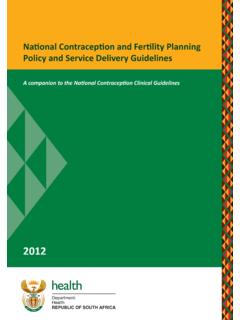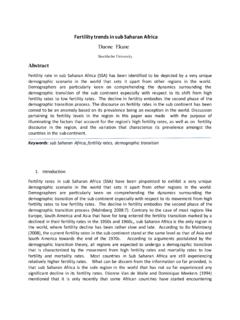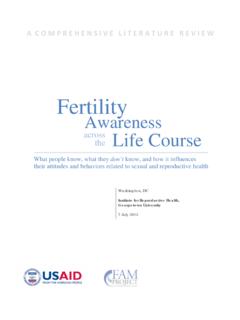Transcription of A companion to the National Contraception and Fertility ...
1 A companion to the National Contraception and Fertility PlanningPolicy and Service Delivery GuidelinesNational Contraception Clinical Guidelines20121 National Contraception CLINICAL GUIDELINESA companion to the National Contraception and Fertility planning policy and Service Delivery GuidelinesPublished by the Department of Health Private Bag X828 Pretoria 0001 south africa December 2012 Copyright: Department of Health, Republic of south africa 2012 For more information:Department of Health Dr Nathaniel Khaole email: ContentsNational Contraception Clinical Guidelines Department of Health 1 Foreword from the Minister of Health 02 Acknowledgements 04 Abbreviations 05 Overview 06 Chapter 1: Introduction to clinical guidelines for Contraception 07 Chapter 2: Clinical guidelines for method provision 15 Chapter 3: Contraception for special needs (adolescents, menopausal women, disabled women and women with chronic conditions) 59 Chapter 4.
2 Contraception and HIV 71 Annexe 77 Appendices 95 References 101 These Contraception clinical guidelines are a companion to the National Contraception and Fertility planning policy and Service Delivery Guidelines (DOH, 2012) which include the following sections:Section A: Background and ContextChapter 1: The bigger pictureChapter 2: Contraception in south africa : An overviewSection B: policy FrameworkChapter 3: Guiding principles, objectives and priority activitiesSection C: Service Delivery Guidelines Chapter 4: Levels of service deliveryChapter 5: Quality of care Chapter 6: Special considerations for service delivery (adolescents, migrants, sex workers, LGBTI, men)Section D: The Client s Consultation: Contraception or conception?
3 Chapter 7: Client s consultation: Fertility choices and planningChapter 8: Client s consultation: ContraceptionChapter 9: Client s consultation: Towards healthy conceptionCONTENTSN ational Contraception Clinical Guidelines 32 Foreword from the Minister of HealthNational Contraception Clinical Guidelines Department of HealthForeword by the Minister of HealthThe National Contraception and Fertility planning policy and Service Delivery Guidelines and National Contraception Clinical Guidelines are extremely important documents aimed at reprioritising Contraception and Fertility planning in south africa , with an emphasis on dual protection. Contraception is one of the most powerful public health tools for any country. Providing women with access to safe and effective Contraception is a critical element of women s health.
4 Enabling women to make choices about their Fertility is empowering and offers women better economic and social opportunities. Birth spacing also improves the opportunities for children to thrive physically and emotionally. Engaging men in sexual and reproductive health encourages shared responsibility in their roles as partners and parents. The adoption of the revised Contraception policy takes place within the context of renewed international focus - at the 2012 global Family planning Summit held in London, the importance of Contraception to human development, gender empowerment, HIV and sexual and reproductive health was once again emphasised. Against this background I am delighted to release the revised policy on Contraception and Fertility planning . It is being launched during an exciting period in the history of health care in south africa , with the re-engineering of primary health care, emphasis on health systems strengthening, implementation of the National Core Standards, and closely linked to this, the introduction of the National Health Insurance.
5 In addition, the policy has been developed against the background of the HIV epidemic. About one third of young south African women are HIV positive, and contraceptive provision and Fertility advice must take this into account. Similarly, two thirds of south africa s young women are HIV negative but are at risk of HIV infection, and their counseling and choices need to take issues related to risk and prevention into consideration. Noting the above, much depends on the successful implementation of this policy . Contraception is one of the World Health Organization s four strategic prongs for the prevention of mother-to-child transmission of HIV. Contraception and planning for conception contributes to the reduction of HIV transmission, thereby supporting the National Strategic Plan on HIV, STIs and TB (2012-2016).
6 It has enormous potential to contribute to south africa achieving its Millennium Development Goals, particularly MDGs 4 and 5. It is also an important part of the strategy to ensure the successful implementation of the African Union s Campaign for the Accelerated Reduction of Maternal, Neonatal and Child Mortality in africa (CARMMA), to which south africa is a signatory. The revision of the Contraception policy was deemed necessary to ensure up to date practice in south africa , and reflects the changes over the last decade in the fields of HIV, contraceptive technology and related research. One of the most significant changes has been the expanded scope of the policy to embrace both the prevention of pregnancy ( Contraception ) and the planning for a healthy pregnancy (conception).
7 The policy also reflects the Department of Health s focus on human rights, quality and integration. Drawing on the expertise of scientists, clinicians, health workers and practitioners, the revised policy provides a framework for a broad, forward looking Contraception and Fertility planning programme, with an emphasis on improved access as well as expanded contraceptive from the Minister of HealthNational Contraception Clinical Guidelines Department of Health Now, more than ever, the successful implementation of this policy is of critical importance. We urgently need to deal more effectively with the challenges facing our country in terms of unacceptably high rates of HIV, teenage pregnancy, unintended pregnancies, infant and maternal mortality, and the elimination of mother-to-child transmission of HIV.
8 Improved access to and use of Contraception will result in a decreased demand for termination of pregnancies. Encouraging women to plan for healthy pregnancies, including timing and spacing, will improve health outcomes for both mothers and babies. However, the realisation of a sound, innovative policy can only be measured by its successful implementation. To ensure that this happens, I call upon all health workers to prioritise the following five key actions:(i) The provision of quality contraceptive health services: We need to ensure that we have a robust health system so that we can provide the contraceptives and services we promise - this involves improved access, expanded choice, quality care, staff training and continuous and efficient commodity supply.
9 (ii) Stimulating community awareness and demand: We need to ensure that our communities understand the importance of Contraception and planning for healthy pregnancies, the range of methods available and where they can be obtained - this requires advocacy and demand creation, underpinned by effective communication strategies which encourage informed decision-making and contraceptive use. (iii) Putting integration into practice: We need to deal with the dual challenges of HIV and unwanted pregnancies, through the promotion of condom use and dual Contraception as well as through the active promotion of integrated HIV and sexual and reproductive health services - we need commitment, creativity and flexibility to actively operationalise integration. (iv) Strategic multi sectoral collaboration: We need to expand access beyond traditional clinical settings and strengthen provision.
10 To this end, we need vibrant, responsive partnerships - with civil society, the private sector, and development and implementing partners. (v) Evidence guided planning and provision: We need to ensure that the implementation of the policy is monitored, evaluated, and that international and local research informs decisions and Contraception Clinical Guidelines Department of HealthAcknowledgmentsThe revision of the Contraception policy has been a collective effort and an extensive consultative process. The Department of Health would like to acknowledge and thank all those who have contributed to this process, through attending meetings, research, writing, commenting on the many drafts and, importantly, engaging in rigorous discussion and debate. To all the organisations and individuals who contributed to the development of the policy (listed in Appendix 1) we extend our sincerest appreciation; without their contribution we would not have developed such a forward-looking, comprehensive and responsive particular, the Department of Health would like to thank: Dr Aaron Motsoaledi (Minister of Health), Dr Yogan Pillay (Deputy Director General: HIV/AIDS, TB and MCWH), Professor Eddie Mhlanga (Chief Director: Maternal and Women s Health) and Dr Nonhlanhla Diamini (Chief Director: Child, Youth and School Health) for their leadership and stewardship in ensuring that reproductive health and rights remain a National health priority.










